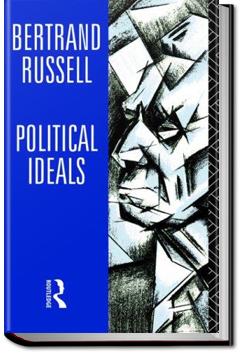UNLIMITED Audiobooks and eBooks
Over 40,000 books & works on all major devices
Get ALL YOU CAN for FREE for 30 days!
Political Ideals
Bertrand Russell
Book Overview:
This is a book by the famous 20th century British philosopher Bertrand Russell on Political Ideals. It was written during the course of World War 1 and contains a critique on the politico economic situation of then Europe. What is interesting is that some of his beliefs are still relevant today.
This is a book by the famous 20th century British philosopher Bertrand Russell on Political Ideals. It was written during the course of World War 1 and contains a critique on the politico economic situation of then Europe. What is interesting is that some of his beliefs are still relevant today.
How does All You Can Books work?
All You Can Books gives you UNLIMITED access to over 40,000 Audiobooks, eBooks, and Foreign Language courses. Download as many audiobooks, ebooks, language audio courses, and language e-workbooks as you want during the FREE trial and it's all yours to keep even if you cancel during the FREE trial. The service works on any major device including computers, smartphones, music players, e-readers, and tablets. You can try the service for FREE for 30 days then it's just $19.99 per month after that. So for the price everyone else charges for just 1 book, we offer you UNLIMITED audio books, e-books and language courses to download and enjoy as you please. No restrictions.
The theory of the legitimate use of force in human affairs, where a government exists, seems clear. Force should only be used against those who attempt to use force against others, or against those who will not respect the law in cases where a common decision is necessary and a minority are opposed to the action of the majority. These seem legitimate occasions for the use of force; and they should be legitimate occasions in international affairs, if an international government existed. The problem of the legitimate occasions for the use of force in the absence of a government is a different one, with which we are not at present concerned. . . Read More
Try now for FREE!

"Love your service - thanks so much for what you do!"
- Customer Cathryn Mazer
"I did not realize that you would have so many audio books I would enjoy"
- Customer Sharon Morrison
"For all my fellow Audio Book & E-Book regulars:
This is about as close to nirvana as I have found!"
- Twitter post from @bobbyekat



Community Reviews
This was a lecture that Russell wrote during the first world war, and thus, contained vital tokens of his political thought along with romantic language he used to encourage. I chose to read this because I am endlessly interested in Russell's critique of BOTH ideologies of conservatism and socialism
If you told me this was published recently I’d believe you
به جز اینکه چقدر نظریات مطرح شده تو کتاب رو دوست داشتم و اینکه تا حدی تونسته بود رخنههای نظریات دیگه رو پر کنه، باید از قلم راسل بگم. قبلا شنیده بودم که چقدر جذاب مینویسه ولی چیزی ازش نخونده بودم. نمیدونم چیکار کرده که انقدر پرکشش و جذابه. اصولا استاندارد لازم برای چنین کتابهایی روان و سلیس بودن
معالجات عميقة بالنسبة لمن يعيش على سطح الوجود ولا يدرك الغيوب
- بين حرب أولى بدأت بالأفول وحرب ثانية كانت تبدو في الأفق كتب برنارد راسل هذه المقالات وتم تجميعها لاحقاً في هذا الكتاب على مدار خمسة فصول. ويلات الحرب العالمية الأولى دفعت بالكثيرين صوب الطوباوية والعالمية في الطرح ومصلحة الإنسانية جمعاء قبل مصلحة الدول/ الأمم، وإنشاء عصبة الأمم (في حينها) كان في ص
দার্শনিক, শিক্ষক, সাহিত্যিক, রাজনীতিবিদ, গণিতবিদ এবং শান্তিবাদী - এরকম একগাদা ভারী ভারী শব্দযুগ্ম প্রয়োজন মনীষী বার্ট্রান্ড রাসেলকে পরিচয় করিয়ে দেওয়ার জন্য। তিনি বরাবরই উচ্চকণ্ঠ সামাজিক, রাষ্ট্রীক এবং মানবিক অবিচারের বিরুদ্ধে। সবচেয়ে বেশি ঘৃণা করতেন যুদ্ধকে। কস্মিনকালেও সায় দেন নি ধনী-নির্ধনের
مثل عليا سياسية - برتراند راسل
بأنجليزية واضحة، كما في أغلب كتبه، يعالج الفيلسوف البريطاني العظيم برتراند راسل في سلسلة محاضرات نشرت في الولايات المتحدة سنة 1918، بعد منعها من قبل السلطات الحربية الأنجليزية من دخول البلاد، يعالج جملة من القضايا السياسية ذات الأهمية البالغة: الرأسمالية، الاشتراكية، ال
Political Ideals is a long lecture that Bertrand Russell was banned from giving (I believe at a university), but which one of his friends read in his stead, and his friend only afterward credited Russell as the writer of the lecture. His friend did this for him because he thought, apparently, the le